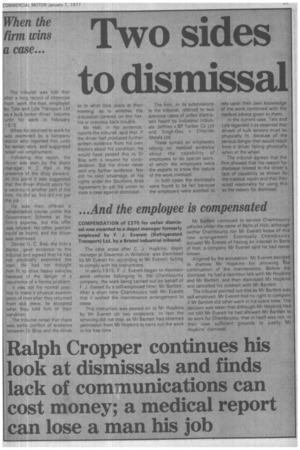Two sides to dismissal
Page 29

If you've noticed an error in this article please click here to report it so we can fix it.
The tribunal was told that after a long record of absences from work the man, employed by Tate and Lyle Transport Ltd as a bulk tanker driver, became unfit fot work in February 1976.
When he returned to work he was examined by a company tor who reported him unfit tanker work, and suggested all van employment.
Following this report, the iver was seen by the depot anager, H. C Hail, in the esence of the shop steward. this point it was suggested at the driver should apply for vacancy in another part of the . He did so, but did not get e job
He was then offered a habilitation course under the vernment Scheme at the m's expense, but this offer s refused. No other position old be found, and the driver s dismissed.
Doctor G. C. Biss, the firm's ctor, gave evidence to the bunal and agreed that he had t physically examined the n. He had not thought m fit to drive heavy vehicles cause of the danger of a urrence of a hernia problem. It was not his normal prace to make a physical exarninon of men after they returned om sick leave: he accepted what they told him of their condition The tribunal noted that there was some conflict of evidence between Dr Bliss and the driver as to what took place at their meeting. as to whether the discussion centred on the hernia or previous back trouble.
Mr Hall, in his evidence, reports the tribunal, said that if the driver had produced further written evidence from his own doctors about his condition, he would have passed this to Dr Biss with a request for consideration. But the driver never sent any further evidence. Nor did he take advantage of his rights under the Southern Area Agreement to get his union to state a case against dismissal. The firm, in its submissions to the tribunal, referred to two previous cases of unfair dismissals heard by industrial tribunals Jeffries v BP Tanker Co Ltd and Smgh-Deu v Chloride Metals Ltd.
These turned on employers relying on medical evidence about the capability of employees to do special work. of which the employers were the experts to know the nature of the work involved.
In both cases the dismissals were found to be fair because the employers were entitled to rely upon their own knowledge of the work combined with the medical advice given to them.
In the current case. Tate and Lyle regarded it as essential that drivers of bulk tankers must be physically fit. because of the serious danger that would result from a driver failing physically when at the wheel The tribunal agreed that the firm showed that the reason for dismissal related to the driver's lack of capability as shown by the medical report and that they acted reasonably for using this as the reason for dismissal.




















































































